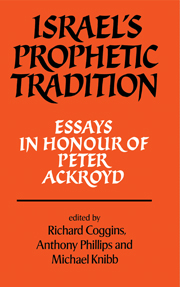Book contents
- Frontmatter
- Contents
- Preface
- Biographical note
- Abbreviations
- Note
- Prophecy in the ancient Near East
- The origins of prophecy in Israel
- Three classical prophets: Amos, Hosea and Micah
- The Isaiah tradition
- An alternative prophetic tradition?
- Visionary experience in Jeremiah
- The Ezekiel tradition: prophecy in a time of crisis
- The prophets of the restoration
- Prophecy and the emergence of the Jewish apocalypses
- Prophecy and wisdom
- Prophecy and the cult
- Prophecy and law
- A change of emphasis in the study of the prophets
- Martin Buber and the interpretation of the prophets
- Index of Biblical References
Prophecy and the emergence of the Jewish apocalypses
Published online by Cambridge University Press: 09 January 2010
- Frontmatter
- Contents
- Preface
- Biographical note
- Abbreviations
- Note
- Prophecy in the ancient Near East
- The origins of prophecy in Israel
- Three classical prophets: Amos, Hosea and Micah
- The Isaiah tradition
- An alternative prophetic tradition?
- Visionary experience in Jeremiah
- The Ezekiel tradition: prophecy in a time of crisis
- The prophets of the restoration
- Prophecy and the emergence of the Jewish apocalypses
- Prophecy and wisdom
- Prophecy and the cult
- Prophecy and law
- A change of emphasis in the study of the prophets
- Martin Buber and the interpretation of the prophets
- Index of Biblical References
Summary
In 1963 the third edition of Rowley's well-known handbook on Jewish and Christian apocalypses was published, and in this, as in previous editions, the view that apocalyptic is the ‘child’ of prophecy is assumed to be almost axiomatic. A similar view was taken in the following year by Russell, whose more substantial presentation of Jewish apocalyptic to a great extent follows the broad lines of Rowley's study; here the links between prophecy and apocalyptic are very fully explored (Rowley, 1963, pp. 15–43; Russell, 1964, pp. 73–103, 178–202). In retrospect it is perhaps a little surprising that neither scholar thought it necessary to refer to von Rad's Theologie des Alten Testaments, in the second volume of which, published in 1960, the idea that there is any connection between prophecy and apocalyptic literature is categorically denied, and the view is presented that wisdom is the matrix from which apocalyptic literature originates. Von Rad's views have, on the whole, not been accepted, but they were influential in provoking a lively debate about the character of the apocalyptic writings. This debate has also been influenced by the attention paid to apocalyptic in New Testament studies and dogmatic theology, but this aspect of the subject lies outside the scope of the present essay (see, e.g., the survey by Koch, 1972, pp. 57–111; the essays in Funk (1969) and Pannenberg (1968); Murdock, 1967; Beardslee, 1971; Braaten, 1971).
- Type
- Chapter
- Information
- Israel's Prophetic TraditionEssays in Honour of Peter R. Ackroyd, pp. 155 - 180Publisher: Cambridge University PressPrint publication year: 1982
- 1
- Cited by



